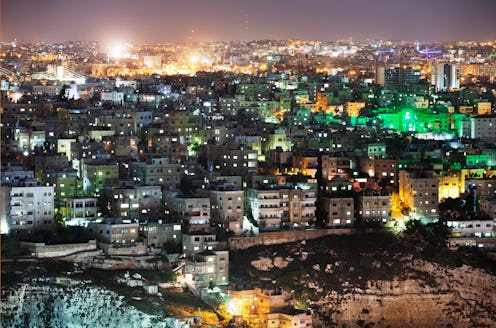Life
This Could Be Why You're Losing Sleep

Anybody who has tried to sleep for more than an hour in New York City will not find this news surprising: light pollution is keeping us awake. In a new study done by the American Academy of Neurology, scientists say that pollution from outdoor lighting is leaking into our bedrooms, and messing with our sleep patterns. The findings will be presented at their annual meeting next month.
"Our world has become a 24/7 society. We use outdoor lighting, such as street lights, to be more active at night and to increase our safety and security," author Maurice Ohayon said in a press release. "The concern is that we have reduced our exposure to darkness and it could be affecting our sleep." It makes sense, too: we've been around for millennia, but electric lights — particularly ones that surround us even when we sleep — are relatively new. (Let us not forget that we also have lights from phones and computers affecting us too!) So even though our brains still equate "light" with "wakefulness," we're confusing them by exposing them to light almost all of the time.
The study was done via a phone survey of 15,863 people over the course of eight years. (Yes, eight years.) Participants were questioned about their medical history, sleep habits and quality, and of course, where they resided. Their addresses were then compared with data from the Defense Meteorological Satellite Program, which measures light pollution.
The results were less than surprising: people living in large cities were exposed to three to six times more light pollution than people in small towns or rural areas. Those same participants were found to be two percent more fatigued and to have roughly 10 minutes less sleep per night than their counterparts. Additionally, they were six percent more likely to get less than six hours of sleep each night, and 13 percent more likely to be dissatisfied with the sleep they did get. But most terrifying of all: they were six percent more likely to wake up confused in the middle of the night, and four percent more affected by daytime fatigue and impaired functioning.
"Light pollution can be found in any sizable city in the world," Ohayon said. "Yet, excessive exposure to light at night may affect how we function during the day and increase the risks of excessive sleepiness. If this association is confirmed by other studies, people may want to consider room darkening shades, sleep masks or other options to reduce their exposure."
But if you're packing up your bags and thinking of booking a one-way train ride to the country, don't move so quickly: the percentages, as you can see, are small at best. While the researchers' theory is technically proven, it's not something that couldn't likely be rectified with some blackout curtains, ear plugs (sound pollution is an issue, too) or a different position for your bed.
Images: Adam Pretty/Getty Images; Giphy (1)